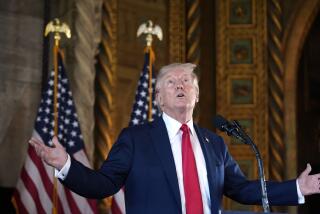Op-Ed: Trump ripped his ‘national emergency’ move straight from the playbook of a dictator
President Trump’s insistence that border security justifies a state of emergency is a tactic ripped from the playbook of another unpopular and frustrated president — the democrat-turned-dictator Ferdinand Marcos of the Philippines.
The messianic Marcos, who claimed in his diary to be doing God’s bidding, took things a lot further than Trump has threatened to do. He imposed martial law nearly a half-century ago, thereby crippling the oldest democracy in Southeast Asia.
But his devastating emergency action — installing himself as dictator to fend off an invented insurgency threat — came from the same well of self-serving motivations and ego-driven politics that feeds Trump’s less menacing wall tantrums today.
As fellow narcissists risking constitutional showdowns for personal political advantage, their similarities are alarming enough to justify a closer look.
As fellow narcissists risking constitutional showdowns for personal political advantage, their similarities are alarming enough to justify a closer look.
While Trump’s mood swings, rants and exaggerations are on regular public display as Twitter posts, Marcos’ temper outbursts were in the form of private, handwritten entries to a personal diary. More than 2,500 pages of that diary and other confidential Marcos papers were leaked to me in 1988, when I was a reporter for the Los Angeles Times.
One obvious similarity between the two men shows up in diary entries bemoaning the Philippine midterms of 1971. Marcos and his Nacionalista Party, like Trump and the GOP in 2018, had suffered sweeping losses in congressional elections. Marcos, like Trump, had boldly declared in advance that the midterm races would be a referendum on his policies and leadership, and he was stung by the results.
Marcos conflated his sudden political vulnerability with increasing risks to the nation, writing: “I now fear for our Republic.” Cut to Twitter in 2019 and it’s a Trump tweet singling out one of his chief rivals, House Speaker Nancy Pelosi (D-Calif.), as “very bad for our country.”
Marcos and many Trump backers, including evangelicals, believe God has political favorites. White House Press Secretary Sarah Sanders told a recent interviewer on the Christian Broadcasting Network that God “wanted Donald Trump to become president. And that’s why he’s there.”
Marcos said God spoke to him personally in a dream, telling him in 1971, according to his diary, that saving the country was his “principle mission in life. … Nobody else can.”
Some of the ways Trump mirrors Marcos are almost uncanny.
When Marcos first ran for president of the Philippines in 1965, for example, he introduced a now familiar campaign slogan, but without the red baseball caps: “Our nation can be great again.” Both leaders raged against “false news” and journalists. Among the words Marcos used to characterize reporters were “rapacious,” “corrupt,” abusive” and “self-righteous.” Sound familiar?
Both men faced numerous allegations of lies and exaggerations. Marcos even lied to his own diary. And both men also had their sex scandals. Marcos’ Stormy Daniels equivalent was Dovie Beams, an American actress who played Marcos’ lover in a pre-campaign propaganda film about the president’s mostly fictional World War II exploits. The film was never released and the actress was never paid. In 1970, she released audio recordings she’d made, “Access Hollywood” style, without his awareness during a lovemaking session.
For Marcos, who desperately wanted to end constitutional term limits so he could run for president a third time, it became clear after his midterm trouncing that he had few options to extend his stay in the presidential palace. He would have to resort to emergency powers.
And to keep his loyal political base, he turned up the heat on a campaign of fears and lies about a contrived Communist menace. American intelligence insisted that Marcos had nothing to fear from a disorganized and lightly armed band of leftist radicals. The CIA called anti-Marcos forces too “small and vulnerable” to pose any threat.
But Marcos, like Trump, ignored inconvenient U.S. intelligence.
Finally, Marcos invented a sham crisis, what he called in his diary “a precipitating event.” He directed Secretary of Defense Juan Ponce Enrile to stage an assassination attempt on himself. The faux attack — an unoccupied government car riddled with machine gun fire — would be blamed on phony insurgents.
On the appointed night in September 1972, Marcos handed out his enemies list with orders to lock them up.
The enemies on that list included prominent members of congress and the country’s leading journalists. Newspaper offices and presses were padlocked. Television news cut to black.
Democracy ended with an eerie silence. Not a shot was fired.
How could it happen so quickly and easily? How could a former American colony with an American constitution and democratic institutions surrender to an autocratic leader’s lies and bullying without a fight?
Enter the Fray: First takes on the news of the minute »
It was hardly a mystery. The free press was shut down. The courts were compromised and intimidated. The political opposition was jailed.
Perhaps the harshest assessment came in the form of a sneer that has been variously attributed to different U.S. officials. It was on the occasion of a Marcos state visit to Washington 10 years into his dictatorship. It still sums up the menace to democracy of an unchecked authoritarian narcissist such as Marcos:
“The Philippines is a country of 40 million cowards and one son of a bitch.”
William C. Rempel, a former Times investigative reporter, is the author of “Delusions of a Dictator: The Mind of Marcos as Revealed in his Secret Diaries.”
More to Read
A cure for the common opinion
Get thought-provoking perspectives with our weekly newsletter.
You may occasionally receive promotional content from the Los Angeles Times.










